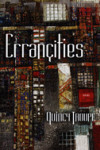Errançities
It’s not just the references to Mad Max in Quincy Troupe’s Errançities which suggest a sense of perpetual collapse. It’s also the rampant amnesia. It’s the ignorance of cultural amnesia, the acknowledgement of this amnesia but having too many of one’s “own vexing / problems, way too many”; it’s the amnesia of important thoughts you fail to record. It’s a desire to be somewhere else, somewhere otherworldly, somewhere “beyond our knowing” where “silence reigns.” It’s a desire to dissociate from the “I” for a while, and to become the “eye” instead. It’s the admission that even you are quick to discard society’s discards. It’s the never-ending cycle of forgetting and reminding. It’s smoothing over the past with a kind of politeness that doesn’t change anything in “these yet to be united states.”
It’s not just the references to Mad Max in Quincy Troupe’s Errançities which suggest a sense of perpetual collapse. It’s also the rampant amnesia. It’s the ignorance of cultural amnesia, the acknowledgement of this amnesia but having too many of one’s “own vexing / problems, way too many”; it’s the amnesia of important thoughts you fail to record. It’s a desire to be somewhere else, somewhere otherworldly, somewhere “beyond our knowing” where “silence reigns.” It’s a desire to dissociate from the “I” for a while, and to become the “eye” instead. It’s the admission that even you are quick to discard society’s discards. It’s the never-ending cycle of forgetting and reminding. It’s smoothing over the past with a kind of politeness that doesn’t change anything in “these yet to be united states.”
Whether it’s Dewey Square, the dusty desert or the New York City subway, Troupe brings you into the scene, even when you feel you’re not meant to be there. Even when you do not want to be there. Troupe’s poems unfurl unforgivingly; he lingers on the details and throws his punches calculatedly, like a boxer whose rage is controlled but not restrained. The “eye” standing in for “I” at times seems to signify greater wisdom and perspective, while elsewhere it becomes the strict observer. Troupe makes you as sympathetic to the crestfallen Wall Street type riding the train out of desperation as to the beggar on the train, eking out a living, which is to say a fluctuating level reflecting an honest account of the inconsistencies of human compassion.
Indeed the ironies of human compassion, and larger human existence, are fertile ground for Troupe. “Mix-y-uppy Memory” focuses on our everyday amnesia in a poem where the narrator ceases to carry on, delirious with thoughts of delicious food, long enough to be put off by a beggar’s repugnant rot. In “Amnesia #3: Photographys & Videos,” Troupe equates a historical lynching-as-spectacle with the seething, uninhibited hatred hurled by the multitudes at President Obama. The ironies speak for themselves.
In Errançities, repetition unnerves: “where all things are elusively fixed, but here / nothing is ever permanent save change after change / nothing is ever permanent save change,” where “save” takes on a secondary, pressing meaning. There is music in these lines, not just in poems about Jimi Hendrix, James Brown, Miles Davis, Michael Jackson or Mozart, but in listing poems which emphasize each word and in poems which demand to be read aloud in performance. Troupe’s poems engage all the senses and burst with so much literal color. In “An Art of Lost Faith,” the very first poem, he writes:
in the beginning was a sound, a crack of light, fissure in the dark
dome of the sky, earth, from which a resonance of air echoed,
perhaps something like a note, a sudden sound,
or wind moving toward expression, a beginning, a seed of language,
perhaps, a hum, a grunt moving toward something clearer, perhaps
Language is a grunt moving toward something clearer . . . perhaps. The collection’s diction fuses textbook “academese” with the colloquial and the language of mythology. “American fusion is iconography rooted in the new/old transmogrification” meets the chants of “ashé, ashé, ashé.” The language in Errançities can be stunningly beautiful—descriptions often consist of a few perfectly well-placed words—it is sharp, lengthy, but not superfluous. It’s equally gritty, as with the image of an overdose that claims a life. If you stop paying attention, you will certainly miss something, a key moment in the story Troupe unravels, a story most closely resembling the haphazard apparitions of various parts of a roadmap, but a roadmap itself which is ever-changing.
The book’s occasional sermonizing does not alienate in an unproductive way. No matter what you bring to the text as the reader, you will undoubtedly be confronted with the shocking and unfamiliar—that with which you have no means of identifying—but you will also be confronted with the painfully familiar and the familiarly painful. Even what once seemed familiar, Troupe casts in a new, more exposed light. Troupe grounds you along the way in experience you can identify, for example “Going Back to Voices Lost in the Past,” a stream-of-consciousness narrative piece about going home and feeling stuck. And those times you do not identify, that’s when you should take care to listen most closely, to check your own privilege. Troupe asks in “A Few Questions Posed,” “would they remember the sermons, the gospel music / they said changed their hearts, their spirits, would they / can they change / their dna of privilege, of never ever fully embracing the other.” Maybe the only constant is change, but Troupe warns against the amnesia that prevents it from being the right change.





